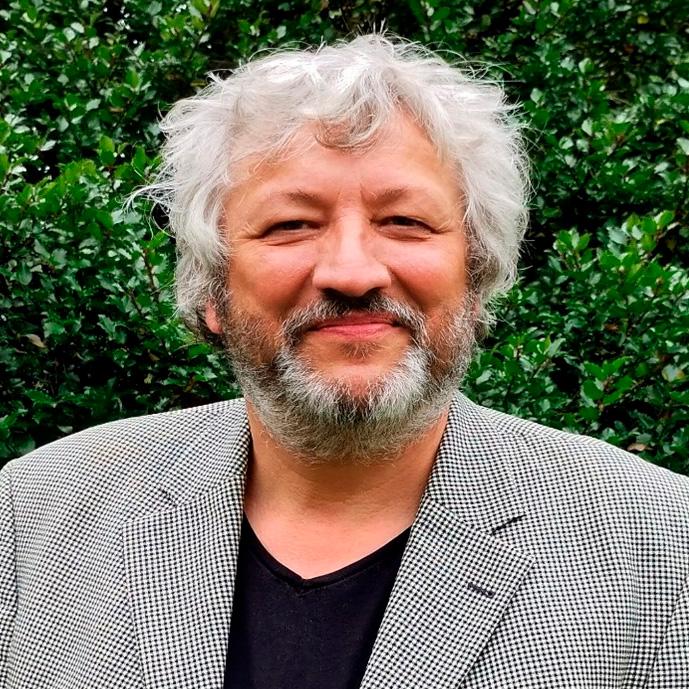
Fellows
-

 Political Science Associate Fellow
Political Science Associate FellowBernhard Stahl
The research project aims to investigate the under-theorized concept of silence within the realm of foreign policy analysis, particularly concerning the silencing of mass atrocities. This project seeks to address the gap in social-constructivist foreign policy research by examining how silence operates and its implications for foreign policy decisions and discourse. The research is motivated by the observation that, despite the widespread acceptance of silence as a significant factor in political science and related social sciences, it has not been adequately explored within foreign policy analysis. The project posits that foreign policy silence does not merely equate to the absence of speech but includes the strategic omission or downplaying of critical issues. This form of silence can shape perceptions and policies in profound ways, often leaving significant matters unaddressed. The project’s theoretical framework challenges the prevailing logocentric focus on articulated language in foreign policy studies. By incorporating silence into the analysis, the studies aim to provide a more holistic understanding of foreign policy. This approach will involve the conceptualization of silence, distinguishing between different types of silence such as imposed silence (resulting from violence or institutional constraints) and purposive silence (intentional non-communication). Empirically, the project will focus on the foreign policies of Germany, France, the United Kingdom, and the United States. This comparative case study will explore how these democracies, which theoretically should engage in open discourse on such severe crimes, often remain silent. By analyzing this silence, patterns and motivations behind the lack of articulation in foreign policy regarding mass atrocities will be uncovered.
To profile -

 International Relations Associate Fellow
International Relations Associate FellowAdam Bower
Outer space technologies—rockets, satellites, and their supporting terrestrial infrastructure—are critical enablers of modern information-centric societies, with applications ranging from intelligence collection, nuclear early warning, and targeting precision-guided weapons to telecommunications and the internet, mapping and geolocation, environmental monitoring, and weather forecasting. Space systems thus contribute to forms of military, environmental, and human security and are increasingly understood to constitute a key element of national defence and economic power. At the same time, leading space powers are developing counterspace capabilities to threaten adversaries’ satellites. There are widespread concerns that outer space governance is insufficient to manage these security challenges, with significant ambiguities and gaps in existing rules. Fundamental obstacles include competing approaches led by China and Russia and the US and other Western states, respectively, with corresponding risk of the fragmentation of space governance.
To profile
My research examines the status and potential trajectories of outer space governance, specifically concerning the characterisation and regulation of military space operations. I theorise the processes through which international norms and legal rules are promoted and resisted and collect empirical data to assess the nature and extent of such change. My fellowship will be dedicated towards advancing two related projects. First, I examine how the unique physical properties of Earth orbit enable and constrain the use of space technologies for (terrestrial) security missions. Second, I identify mechanisms and processes through which norms regulating military space activities may emerge and transform. My overarching goal is to better integrate outer space into the study of global politics and generate new academic knowledge which can in turn inform policy deliberations among governmental, non-governmental, and commercial space actors aimed at preventing armed conflict in outer space.
-

 Peace Studies and Political ScienceAssociate Fellow
Peace Studies and Political ScienceAssociate FellowMariia Levchenko
National Dialogues have increasingly become vital for managing political transitions and fostering sustainable peace worldwide. This research project seeks to understand the effectiveness of National Dialogues by examining cases in Chad and the potential for such a process in Ukraine. By analyzing both the political and procedural elements, along with the contextual factors that influence outcomes, this study aims to provide a nuanced understanding of how these inclusive dialogues can resolve conflicts and support post-conflict/war recovery.In 2022, Chad implemented a National Dialogue involving diverse stakeholders—from the ruling junta to civilian groups—which aimed to enhance national cohesion and lay foundations for a peaceful future. However, the effectiveness of this dialogue hinges not just on its conduct but also on the ongoing engagement and implementation of agreements. Similarly, Ukraine, which is currently fighting an invasion and considering the implementation of a Peace Plan formula, presents a unique scenario to explore the potential and challenges of initiating a National Dialogue there. The anticipated comparative analysis will highlight common features, challenges, and lessons from both contexts, offering insights beneficial for other regions experiencing political upheaval.
To profile -

 Economic DevelopmentAssociate Fellow
Economic DevelopmentAssociate FellowAbiodun Egbetokun
In recent years, Chinese investments in Africa have surpassed those of traditional Western donors, making China the continent’s largest investor. Chinese foreign direct investments (FDI) offer significant potential for economic growth by providing essential infrastructure, capital, and industrial capabilities. However, the nature and conditions of these investments differ markedly from those of Western donors, often leading to debates on their true benefits and potential drawbacks. China’s approach to aid and investment in Africa, characterised by fewer conditions compared to Western aid, has raised concerns about the long-term implications for governance and economic independence in recipient countries. Critics argue that this “rogue aid” can support corrupt regimes and increase debt burdens, though empirical evidence on these claims is mixed. While some studies highlight the positive impacts of Chinese investments on productivity and industrial growth, others point to negative effects such as heightened competition for local businesses and increased economic dependency.
To profile
This project aims to examine the sectoral evolution of Chinese FDI in Africa and its impact on employment, a critical issue given Africa’s high unemployment rates. The project will provide a nuanced understanding of the role of Chinese FDI in Africa’s development. The findings will inform strategies that can better integrate Chinese and Western investments to support Africa’s industrialisation and economic diversification, to maximise the benefits of such investments while minimising potential risks.
-

 International Political TheoryAssociate Fellow
International Political TheoryAssociate FellowMilla Vaha
The research project undertaken by Ms. Milla Vaha delves into the profound impacts of historical nuclear testing and contemporary climate change on the existential security of Pacific Island nations. Spanning from 1946 to 1996, nuclear tests conducted by major world powers have left a lasting legacy on regions such as Kiribati, the Marshall Islands, and Maohi Nui (French Polynesia). This study seeks to elucidate the interconnections between these historical events and the current climate crisis, exploring how the remnants of nuclear activities have shaped these communities’ perceptions of existential threats. The research is structured around pivotal questions addressing the extent to which nuclear testing has influenced the perception of climatic existential threats, how nuclear legacies have informed national and regional security frameworks, and the continuous impacts of vulnerabilities introduced during atomic testing on climate resilience. Through a combination of archival research, interviews, and desk research, the project aims to provide novel insights into the study of existential threats within the realm of International Relations and political practice. It further aspires to offer policy recommendations for addressing losses and damages due to climate change by linking them to the historical responsibilities of nuclear powers. Focusing on three case studies—Marshall Islands, Kiribati, and Maohi Nui—the research highlights the unique vulnerabilities of these small island entities, which have been significantly impacted by their nuclear history. The choice of these cases is justified by their shared experiences as nuclear testing sites and their distinct sovereign statuses, providing a comprehensive understanding of how historical legacies influence current security scenarios and policy responses. The research not only contributes to our understanding of existential threats and security in International Relations but also addresses the broader implications of climate justice and the historical responsibilities of nuclear powers, thereby providing a meaningful framework for compensatory policies for the affected Pacific Island communities.
To profile -

 International LawAssociate Fellow
International LawAssociate FellowGüneş Ünüvar
My project explores the conceptualization of outer space as an environment, and its implications for international law, particularly concerning environmental protection and foreign investments. The study aims to reconceptualize outer space, especially Earth’s orbit, as an environmental domain subject to regulatory measures similar to those applied to terrestrial and atmospheric environments. The research is motivated by the rapid growth in both public and private space endeavors, which include satellite operations, space tourism, resource extraction and utilization, as well as potential extraterrestrial settlements. With regard to orbital activities, the focus will be on the accumulation of space debris, presenting significant risks such as orbital collisions, which could eventually render Earth’s orbit unusable—a scenario known as the Kessler Syndrome. Given these concerns, the project examines whether space should be classified as an environment requiring protection.
To profile
Through environmental sociology, the project will show that while environmental protection is one aspect of our interaction with outer space, environmental utilization, risk mitigation, scientific engagement, and cultural preservation are parallel manifestations of outer space as environment, and crucial aspects of our engagement with it. Building upon this framework, the project’s key contribution is to show how this taxonomy helps better conceptualize the leeway of states regulating space activities, as well as rules and principles in international law, applicable to environmental protection and policies instigated by states.
A central aspect of this study is the investigation of how categorizing space as an environment influences international investment law, particularly regarding state regulations and their impact on private sector activities. The project posits that space, much like terrestrial and atmospheric domains, can be subject to environmental protection measures which may conflict with commercial interests. This conflict is explored through the lens of international investment agreements (IIAs) and arbitration cases where states have imposed environmental regulations impacting foreign investments.
-

 Space Policy and EconomyAssociate Fellow
Space Policy and EconomyAssociate FellowRaúl González Muñoz
This project looks to identify and analyse the key challenges and enablers encountered in the implementation of the European Union Space Strategy for Security and Defence, unveiled on March 10, 2023 by the European Commission and the High Representative (HR) for Foreign Affairs and Security Policy, Josep Borrell.
To profile
This project will focus in four main areas: (1) space industrial capacity of the EU; (2) space industry frameworks in Europe compared to USA analogues; (3) space market harmonization in Europe supported by a shared space law; and, (4) space as a vector for European integration.
The final aim of the research is to provide a structured analysis with a particular focus on the industrial capacity of the European space sector compared to other space faring powers, as well as the dynamics of great power competition in space and the role Europe could play in the future geopolitical landscape.
-

 Political Science Associate Fellow
Political Science Associate FellowTamirace Fakhoury
What does refugee politics reveal about policy dissonance? And how does it enable a nuanced insight into the spatiality and dispersion of power beyond the focus on classical geopolitics? My research project looks at refugee policy in the Euro-Middle East as a messy spatiality of power where asylum policies and bordering practices mutually influence and contest each other. I draw on relational approaches that decenter the focus from EU governance and that conceptualize the political agency of the so-called ‘borderlands. Building on the case of Syrian displacement, I explore how Middle East polities and societies have shaped the EU’s resilience-building discursive practices and externalization strategies of migration control. I further explore what this means for refugees’ rights and protection, and for responsibility-sharing.
To profile
The project is structured around four streams:
– How have governments in the Middle East interpreted and enacted the EU’s external refugee instruments? In what ways have their governance legacies, legal frameworks, and economic systems reshaped the EU’s normative and funding power?
– What are the on-the-ground effects of the refugee instruments that have been negotiated, particularly in terms of asylum policy formulation, and the livelihoods and protection of refugees in the region?
– Which “pathways” and “criteria for evaluation” (Young 1978) might clarify the limited impact of the EU’s funding power in addressing prolonged displacement in the Middle East, despite the EU’s declared aims of promoting resilience and joint burden-sharing?
-And (as an avenue for further research), how can the EU and regional host states in the Middle East draw on their contentious cooperation on refugee issues as an opportunity for reflexive and learning-based governance?
-

 Political Science Associate Fellow
Political Science Associate FellowTamirace Al Fakhoury
What does refugee politics reveal about policy dissonance? And how does it enable a nuanced insight into the spatiality and dispersion of power beyond the focus on classical geopolitics? My research project looks at refugee policy in the Euro-Middle East as a messy spatiality of power where asylum policies and bordering practices mutually influence and contest each other. I draw on relational approaches that decenter the focus from EU governance and that conceptualize the political agency of the so-called ‘borderlands. Building on the case of Syrian displacement, I explore how Middle East polities and societies have shaped the EU’s resilience-building discursive practices and externalization strategies of migration control. I further explore what this means for refugees’ rights and protection, and for responsibility-sharing.
To profile
The project is structured around four streams:
– How have governments in the Middle East interpreted and enacted the EU’s external refugee instruments? In what ways have their governance legacies, legal frameworks, and economic systems reshaped the EU’s normative and funding power?
– What are the on-the-ground effects of the refugee instruments that have been negotiated, particularly in terms of asylum policy formulation, and the livelihoods and protection of refugees in the region?
– Which “pathways” and “criteria for evaluation” (Young 1978) might clarify the limited impact of the EU’s funding power in addressing prolonged displacement in the Middle East, despite the EU’s declared aims of promoting resilience and joint burden-sharing?
-And (as an avenue for further research), how can the EU and regional host states in the Middle East draw on their contentious cooperation on refugee issues as an opportunity for reflexive and learning-based governance?
-

 Political ScienceAssociate Fellow
Political ScienceAssociate FellowReza Hasmath
This project looks at how the Chinese citizenry currently think about the world, and its implications for future foreign relations with Western jurisdictions. It draws upon hard to access representative data from the 2023 and 2024 Chinese Citizens’ Global Perception Surveys (CCGPS) conducted by the Investigator. The CCGPS look at mainland Chinese citizens’ perspectives on China’s current relations with global actors, including, Australia, Canada, EU, France, Germany, India, Japan, Russia, UK and USA.
To profile
The project will examine four key areas of analytical interest: (1) Chinese citizens’ global perception of trusted partners, and those jurisdictions that may be more antagonistic in the near future; (2) views on China’s global roles; (3) preferences for foreign tourism, study, work and emigration; and, (4) Chinese citizens’ sources and knowledge of global jurisdictions.
The ultimate aim of the project is to provide timely, data-driven evidence that can assist key stakeholders to develop targeted and considered strategies for enlightened and productive engagement with mainland China.
-

 PhilosophyAssociate Fellow
PhilosophyAssociate FellowChelsea Haramia
Dr. Haramia’s research focuses on global planning for post-detection scenarios, i.e., scenarios that humans may face following a successful detection of extraterrestrial life or technology in outer space. Gauging public attitudes towards candidate global actions is fundamental for ethical questions of global consent. Informed consent, when it is possible to obtain, is arguably critical for morally appropriate representation and risk taking. Thus, consent regarding risk and representation is a crucial area of targeted analysis in current post-detection research. Dr. Haramia’s work underscores the need to navigate speculative discourse and promote ethical inquiry in order to leverage existing resources for effective preparedness.
To profile
Central to her research agenda is the exploration of methodologies for assessing public attitudes towards global risks and securing global consent for post-detection proposals. She outlines both theoretical and concrete strategies aimed at advancing research into post-detection. She poses pivotal questions to guide her investigation, delving into the necessity of current and future tools, policies, and interdisciplinary research frameworks for navigating potential contact with extraterrestrial entities. Additionally, she explores the potential of foresight studies training and AI-driven programs in bolstering global preparedness and representation, addressing concerns of overrepresentation, misrepresentation, inclusion, and others in planetary future planning endeavors.
Dr. Haramia’s work stems from a comprehensive overview of the historical context of post-detection research, tracing its origins from the early days of SETI science to the formulation of contemporary post-detection protocols.
Moreover, she underscores the crucially interdisciplinary nature of research in this field and emphasizes the value of collaborative initiatives. Her overarching goal is to develop defensible thresholds for informed consent and to explore avenues for globally-focused programs that will help to prepare humanity for a post-detection future.
-

 Political Science Associate Fellow
Political Science Associate FellowInci Öykü Yener-Roderburg
Inci Öykü Yener-Roderburg is conducting a research project that investigates the intricate interplay between religion, diaspora associations, and extraterritorial voting (EV) within the context of Turkey-originating communities in Germany. With the introduction of remote enfranchisement in 2012, Turkish diasporas have witnessed a unique form of political mobilization, yet the specific influence of religious associations on voting behavior remains understudied.
To profile
Drawing on a multidisciplinary approach, this study aims to shed light on three main objectives: Firstly, it seeks to elucidate the significance of religion in shaping political mobilization within diasporas, with a particular focus on Alevi and Sunni faith-based diaspora organizations in Germany. Secondly, it analyzes the mechanisms through which these religious associations facilitate and promote voting participation during Turkish electoral cycles in Germany and during German electoral cycles in Germany. Lastly, it adopts a gender-sensitive perspective to examine the role of women within these organizations and their impact on EV.
Despite the growing body of literature on emigrant enfranchisement, the role of religion in influencing voting behavior remains largely unexplored. By focusing on Turkey-originating faith-based diaspora organizations in Germany, this research aims to fill this gap and provide a nuanced understanding of the complex dynamics at play.
Through a combination of qualitative methods including ethnographic research and in-depth interviews, this study aims to uncover the motivations, challenges, and strategies behind voting and mobilization within diaspora communities. By examining the intersection of religion, citizenship, and political engagement, it seeks to contribute to broader discussions on diaspora politics and transnational political participation.
The significance of this research extends beyond academic inquiry, as it has implications for understanding the evolving nature of political participation among diaspora communities, its impact on ‘homeland’. This study delves into the role of religious associations as significant agents in extraterritorial voting, as well as their potential impact on elections in resident countries. The aim is to offer insights that can inform policy-making and deepen our understanding of diaspora engagement in democratic processes within a transnational context.
